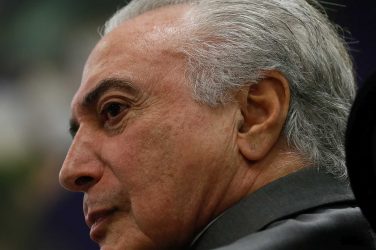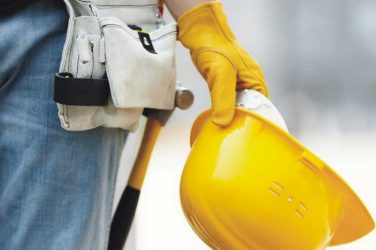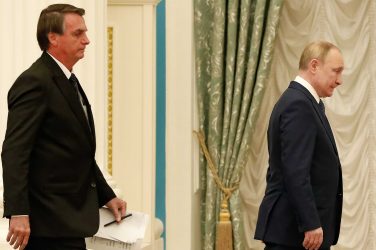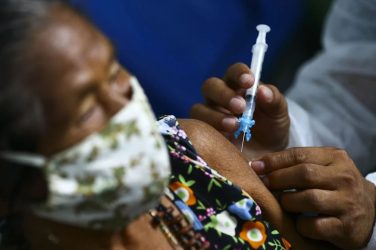Brazil’s President Michel Temer on Tuesday called on Russian businesses to invest in the development of infrastructure in the Latin American country, including its ports and roads. The Brazilian leader arrived in Moscow to hold a number of visits with the Russian leadership.
“We are implementing a program of privatization of state property and granting concessions. During the visit I will meet with Russian investors and I want to invite them to make their investments more actively into sectors of our economy including energy, roads, railroads, ports and airports,” Temer said during his meeting with Russian lower house of parliament speaker, Vyacheslav Volodin.
According to the Kremlin press service, on Wednesday, Temer will meet Russian President Vladimir Putin and the two leaders will sign a number of bilateral documents. Brazilian Foreign Minister Aloysio Nunes said that the presidents could discuss a number of issues, including counterterrorism and the crises in North Korea and Syria.
“In the year I assumed the president’s office [August 2016], bilateral trade between our countries grew significantly. If we look at the exports and imports, the increase amounted to 40 percent,” Temer said during his meeting with Vyacheslav Volodin, the speaker of the lower house of Russia’s parliament.
The Brazil-Russia agreements are expected to contribute to an increase in bilateral cooperation and will “demonstrate the significant maturity of our bilateral relations,” the Brazilian leader noted.
In the conversation with Volodin, Temer noted that he liked the speaker’s proposal to develop and deepen cooperation between the Russian and Brazilian parliaments.
“It is necessary to move to the wider issues, including economic cooperation,” Temer further added.
As part of the meeting, the Brazilian president invited Volodin to visit Brazil.
Brazil’s Foreign Minister Aloysio Nunes Ferreira said in an interview to Russia’s Rossiyskaya Gazeta newspaper that the two leaders were expected to discuss a wide range of issues including but not limited to the issues of preserving peace, the fight against international terrorism and the situation around both North Korea and Syria.
Two Centuries of Friendship
The relations between Russia and Brazil were initially established on October 3, 1828 and suspended in the wake of the Russian Revolution of 1917. The diplomatic ties were restored for two years in 1945 while their final restoration took place in 1961. Brazil became one of the first countries to recognize the Russian Federation as a successor state to the Soviet Union on December 26, 1991.
In June 2000, Moscow and Brasília signed the Treaty on Partnership Relations. In November 2004, Russia’s President Putin traveled to Brazil marking the first visit by a Russian head of state to the country in the history of the bilateral relations.
In recent years, the Russian-Brazilian relations have been characterized by the positive dynamics. The Russian president visited Brazil in November 2004, November 2008 and July 2014, while the Brazilian leaders came to Russia in January 2002, October 2005, May 2010 and December 2012.
Apart from this, the presidents of Russia and Brazil met on the sidelines of various summits and conferences such as the 2011 BRICS Summit in China, the G20 Summit in Mexico in 2012, the United Nations Conference on Sustainable Development (UNCSD) in Brazil in 2012, the 2013 G20 Summit and the 2015 BRICS Summit in Russia.
In 2015, the BRICS countries’ leaders held an unofficial meeting on the sidelines of the G20 Summit in the Turkish city of Antalya. In 2016, the BRICS heads of state and government met ahead of the G20 Summit in the Chinese city of Hangzhou.
On September 16, 2015, Moscow hosted the seventh meeting of the Russian-Brazilian High-Level Commission on Cooperation, chaired by Russian Prime Minister Dmitry Medvedev and then-Vice-President of Brazil Michel Temer.
The meeting’s agenda was focused on cooperation in such spheres as trade, economy, investment, military equipment, energy, aerospace, agriculture, scientific research and culture.
During his visit to Moscow, Temer also met with Sergey Naryshkin, then speaker of the lower house of Russia’s parliament, and Valentina Matvienko, the head of the parliament’s upper house.
The two countries’ foreign ministries also maintain regular dialogue. On February 16, 2017, Russia’s Foreign Minister Sergey Lavrov had a conversation with then-Foreign Minister of Brazil Jose Serra on the sidelines of the G20 foreign ministers meeting in the German city of Bonn.
Brazil is Russia’s major trade partner in Latin America accounting for about 40 percent of Russia’s trade in the region.
In 2016, the turnover between Russia and Brazil totaled US$ 4.31 billion, including US$ 1.76 billion in exports and US$ 2.52 billion in imports from Brazil.
Brazil is listed as 23rd in Russia’s foreign trade balance in 2016, down from 22nd place in 2015.
According to media reports, summarizing various data of Russia’s Federal Customs Service, the country’s exports to Brazil in 2016 were dominated by chemical goods forming 72 percent of total exports to Brazil. Among the products, exported from Russia to Brazil, there were also minerals (22 percent), metals and metal products (2 percent), machinery, equipment and transportation vehicles (1.88 percent).
Russia’s imports from Brazil include food and agricultural products (87 percent of total imports from the country), chemical products (5 percent), machinery, equipment and transportation vehicles (4 percent), metals and metal products (3 percent).
Apart from this, Brazil is the largest exporter of food and agricultural products to the Russian market among the countries outside the former Soviet Union. Additionally, it is the top supplier of such goods as frozen meat, pork and cane sugar.
The major Russian companies operating in Brazil include those in the oil and gas sector (Rosneft), electric power industry (Power Machines), nuclear energy (Rosatom), chemicals (Uralkali), pharmaceuticals (Biocad) and agriculture (Sodrugestvo Group). Russian companies have a share in almost all the sectors of the Brazilian market while over fifty Brazilian companies are operating in Russia.
The Intergovernmental Russian-Brazilian Commission on Trade, Economic, Scientific and Technological Cooperation plays the key role in expanding trade and economic relations between the two countries. The tenth regular meeting of the commission was held in May 2017 in Brazil.
Despite the distance separating the two countries, cultural ties between Russia and Brazil have been actively developing.
The increasing number of Russia’s artistic groups on tours to Latin America, the organization of art exhibitions, Russian cinema weeks, and days of the Russian culture contribute to strengthening of the cultural cooperation between the countries.
The opening of the first, and so far the only, school of the Russian Bolshoi Theater in the Brazilian city of Joinville has been the major cultural cooperation project to date. Almost 300 students from across Brazil and a number of neighboring countries are currently studying in the school.
The Brazilian Cultural Center operating since 2013 in Moscow hosts regular lectures, concerts, seminars and other cultural and educational events.
Sputnik












